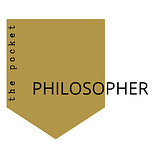Good morning friends,
Welcome to our weekly rundown. Today we’ll be recapping the various elements of the philosophy of nondoing that we discovered this week.
As always, please screenshot and share anything you find interesting with your friends, and leave a comment below with your thoughts!

Monday
Oftentimes, philosophy can feel like an academic discipline stuck in the clouds, reserved for a few and irrelevant to the masses. But truly, the intent of all philosophy is to understand life, and in that way we are each a philosopher working out our own story and purpose day in and day out.
Philosophers used to set themselves to knowing everything—to understanding a finite set of facts and relationships to gain wisdom. Today, philosophers (and that includes you!) are seeking the real wisdom that withstands the test of time. This wisdom is a carefully constructed worldview that allows us to understand anything new we might encounter. This worldview must be robust, tested, and inclusive.
And more than anything, that is what we are doing here at TPP.
And so to aid in this process as well as the advancement of our ultimate goal to increase our compassion and empathy, this week we’re going to start a two part series that will last until next Friday.
Some might call this two week discussion a conversation about epistemology (a.k.a theories of knowledge.) Others might incorporate it into a conversation about the Philosophy of the Mind or Consciousness. And yet others might label it as a reflection on the Philosophy of Science, analyzing ideas that most often discussed as rote facts or data.
Most of what we’ll be discussing has come from a reflection that writing this daily newsletter has sparked within me. I have noticed how much emphasis the larger philosophical tradition places on thinking. And, on the flip side, how little attention is given to the intuitive and non-linguistic wisdom of our bodies or deeper selves.
There is so much more intelligence within us than our ability to have controlled thoughts.
Tuesday
Sleep is much more intelligent than we have previously considered. It not only takes individual pieces of information and saves them and protects them, but sleep can intelligently cross-link new pieces of information together. As a result, you can start to extract commonalities and develop novel insights into problems that you were having the day before.
—Matthew Walker in an interview with Jill Suttie
Humans didn’t evolve sleep, in fact sleep predates our species.
That is an incredible fact, that sleep is something much bigger than even our species, our biohacking, and our innovation. It’s a universal need. Even earthworms do it!
Have you ever thought about how important sleep is? The only more important automatic function in our body is breathing (which we’ll cover tomorrow).
You need to sleep as much as you need water. And yet, sleep is so often where we try to “get ahead,” to “shave time,” to “squeeze in” a few minutes of pleasure or work at the end of the day.
We spend roughly a third of our life asleep, and this state is far more healthy, productive, and healing for us than any of the stress, strain, and danger we put ourselves through when we are awake.
So the real question isn’t “how do I sleep as minimal as possible,” or “why do I need sleep,” it’s actually “why am I awake?”
Wednesday
“A practice that helps coordinate body, energy, and mind while making us more balanced and free from tension is immensely important. When we have a more relaxed mind, it is possible to have a better, more harmonious, and healthy life.”
—Chögyal Namkhai Norbu
We begin life with an inhale, and end with an exhale.
Life is breath.
Yesterday we considered the intelligence of sleep, and today we’ll note the healing energy of breath. We’ll approach this topic through Yantra Yoga, which is a school of philosophy, spirituality, and practice originating in Tibetan Buddhism.
Yantra Yoga can best be understood by comparing it first to its counterparts Asana or Hatha Yoga. These forms of Yogic practice are what most folks in western countries have been first introduced to as yoga—static poses that aid in the health and longevity of our body and mind.
Yantra Yoga on the other hand is not static, and seeks to “coordinate and harmonize one’s personal energy so that the mind can relax and find its authentic balance.”
At the core of Yantra Yoga is seven phases movements which are connected to seven phases of breathing. This breathing is meant to bring specific elements of healing, awareness, and overall harmony into our lives. It is based on an ancient text called the Nyida Khajor which roughly translates to the “Union of the Sun and the Moon.”
The entirety of Yantra is about finding the harmony that exists between the tensions and opposites of our lives.
Thursday
The Eucharistic mime, and that is what it is—a story enacted through motions more than words—has four main aspects that we are to imitate from Jesus’ first enactment:
1) You also should take your full life in your hands.
2) You then thank God (eucharisteo in Greek)
3) You choose to break your life and death wide open.
4) You then chew on this mystery for all the rest of your days!—Father Richard Rohr
Having personally grown up around various and diverse sects of Christianity, I have seen that approaching the Eucharist can mean everything from an intimidating solemn ritual, to a joyous and vibrant party.
Rohr often works to break apart eating as a practice from the confines of a Sunday morning ritual, to reveal the everyday practicality and mystery of christ consciousness. Eating is where the two aspects of the Christ nature—the human and the divine—are to meet and are to find reconciliation within and among us.
One of the ways to cultivate this in-betweenness in which we find ourselves, is to keep practices like the Eucharist which remind us of our own christ nature through mime or action. This visceral teaching is a way to impart a reality often more difficult to articulate or rationalize than sense or feel.
From this perspective, every meal is an opportunity to practice mindfulness, remind ourselves of our deep potential and holy nature, to extend that grace to others, and to chew on the mystery of life, death, and love.
Conclusion
Looking back at this week’s work, it’s clear that there is a world of a wisdom available not in our thinking, but in the life we inhabit day to day.
And I’ve noticed a few themes when considering the philosophy of nondoing that I’d like to share.
The wisdom of passive, automatic, or the nondoing is often cultivated not in thinking, but in awareness. Being aware of what is already there or already happening can often be much more insightful than thinking or problem solving.
Many of the thing our bodies do, predate even our species. We didn’t evolve to sleep, sleep existed before us, and we were created in a sleep state largely unconscious for the first few months of our lives. The real question is, why do we wake up?
Life has much to teach us when we seek wisdom not as a tool available to humans, but something existing in all of reality.
I hope you’ve enjoyed this week’s study, I know it was a bit different! I’m excited to pivot next week and consider the opposite end of the theme as we consider the philosophy of action, starting with work.
Until then friends, have a great weekend, and thank your body for all its doing and teaching you!
Matt














Share this post